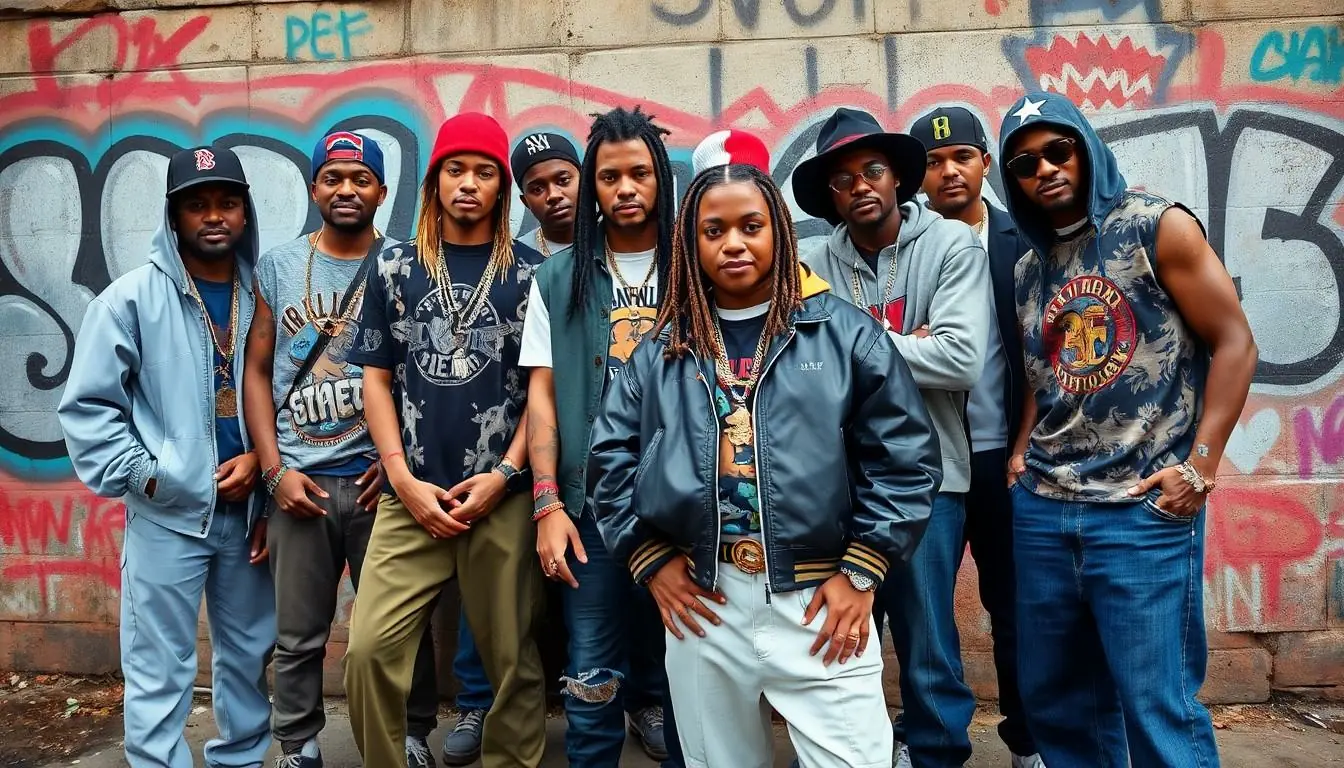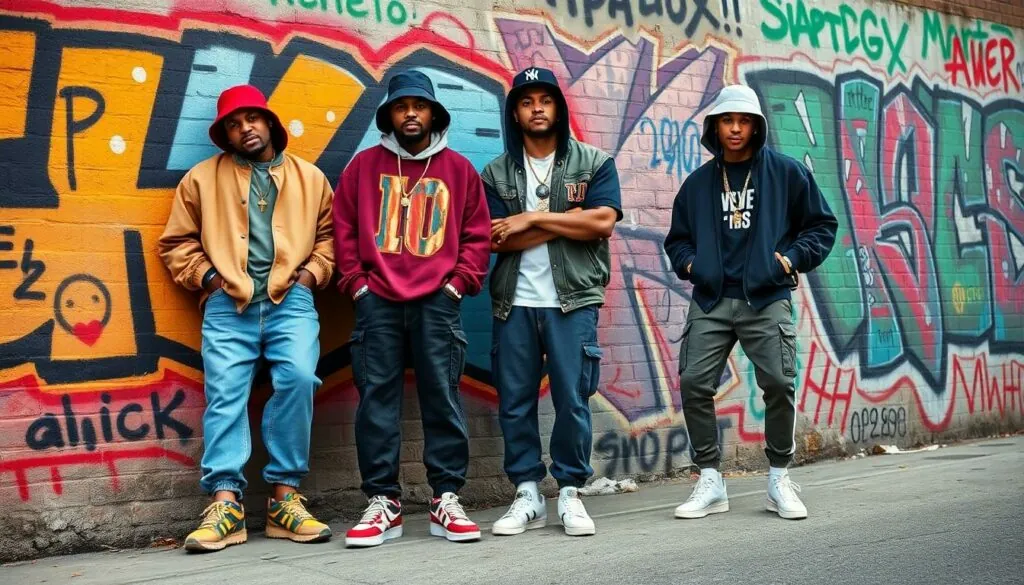Table of Contents
ToggleThe ’90s were a golden era for hip hop, bursting with creativity and unforgettable beats that still make heads nod today. Picture this: baggy jeans, oversized jackets, and a whole lot of swagger. It was a time when groups like Wu-Tang Clan and A Tribe Called Quest weren’t just making music; they were crafting an entire culture that transcended generations.
Overview Of 90s Hip Hop Groups
The 1990s witnessed the emergence of groundbreaking hip hop groups that defined the genre’s evolution. Notable acts like Wu-Tang Clan redefined group dynamics and introduced complex lyricism. This collective not only gained fame for its unique album strategy but also popularized solo careers within their framework.
A Tribe Called Quest blended jazz influences with innovative sampling techniques, creating a distinctive sound that appealed to a broad audience. Their thought-provoking lyrics addressed social issues, offering both entertainment and insight.
The Fugees captured attention with their catchy hooks and engaging sound. Their album, “The Score,” showcased a mix of R&B and hip hop, featuring tracks like “Killing Me Softly.” This fusion demonstrated the genre’s versatility.
Naughty By Nature, known for their infectious energy, made significant contributions with hits like “O.P.P.” Their ability to merge catchy choruses with street narratives resonated with fans, reinforcing their place in hip hop history.
Additionally, Bone Thugs-n-Harmony introduced fast-paced, melodic delivery that differentiated them from their peers. Their collaborative work with artists like Tupac Shakur expanded their reach, showcasing their unique style.
Public Enemy maintained a focus on political messages, using their platform to address social injustices. Their powerful lyrics and dynamic performances emphasized the role of hip hop as a catalyst for change.
In sum, 90s hip hop groups not only pushed musical boundaries but also influenced cultural movements. Each group contributed distinct elements that enriched the genre, leaving a legacy that continues to inspire artists today.
Iconic 90s Hip Hop Groups

The 1990s showcased an impressive array of hip hop groups. Their influence and creativity shaped the genre and its cultural significance.
A Tribe Called Quest
A Tribe Called Quest blended jazz elements with hip hop, creating a unique sound that resonated with audiences. Their albums, especially “Low End Theory,” featured innovative sampling techniques. Tracks like “Can I Kick It?” and “Scenario” demonstrated their lyrical prowess. Collaboration with other artists brought additional depth to their music. A Tribe Called Quest remains a significant influence in hip hop today.
Wu-Tang Clan
Wu-Tang Clan revolutionized hip hop group dynamics with their debut album, “Enter the Wu-Tang (36 Chambers).” Their raw, street-oriented lyrics showcased storytelling skills and varied perspectives. Each member contributed distinct styles, enriching the collective’s sound. Hits like “C.R.E.A.M.” and “Protect Ya Neck” became anthems of the era. Wu-Tang’s impact extends beyond music, influencing fashion and culture.
N.W.A
N.W.A emerged as pioneers of gangsta rap, addressing social issues directly in their lyrics. Their album “Straight Outta Compton” sparked conversations about racial inequality and police brutality. Bold, unapologetic tracks like “F*** tha Police” resonated with listeners seeking representation. N.W.A’s fearless approach redefined what hip hop could express. Their legacy persists, inspiring artists committed to societal change.
The Influence Of 90s Hip Hop
The influence of 90s hip hop extends beyond music, shaping various aspects of culture and society. Groups from this era set the stage for future generations of artists and activists.
Cultural Impact
Cultural influences from 90s hip hop permeate fashion, language, and lifestyle. Baggy pants, oversized shirts, and statement sneakers became staples, reflecting a distinct style embraced by youth. The genre fostered a unique lexicon, introducing phrases that entered everyday conversations. Artists addressed themes like identity, race, and urban struggles, resonating with audiences and sparking dialogue. Events such as the Big Daddy Kane concert in 1992 showcased the community’s strength and unity. Collaborations between hip hop artists and visual artists led to the creation of iconic graffiti and street art, further enhancing the genre’s cultural significance.
Musical Innovations
Musical innovations from 90s hip hop transformed the landscape of music entirely. Groups like Wu-Tang Clan introduced complex lyricism, incorporating storytelling with intricate wordplay. A Tribe Called Quest uniquely blended jazz samples with innovative beats, creating a new soundscape that influenced countless artists. The incorporation of live instruments and diverse genres in tracks pushed sonic boundaries, encouraging experimentation. Techniques such as sampling and scratching became more sophisticated, solidifying hip hop’s creative process. Collaborative efforts among groups also paved the way for genre fusion, inviting influences from R&B, rock, and funk, redefining the musical experience.
Notable Female Artists
The 1990s showcased incredibly talented female artists who made a lasting impact on hip hop. Their contributions shaped the genre and influenced future generations of musicians.
Salt-N-Pepa
Salt-N-Pepa, consisting of Cheryl James and Sandra Denton, broke barriers with their bold style and catchy lyrics. Their hit singles like “Push It” and “Shoop” dominated the charts, pushing hip hop into the mainstream. Their combination of hip hop, R&B, and pop made their music accessible, appealing to a diverse audience. Recognized for their empowering messages, they challenged societal norms surrounding women in music.
Queen Latifah
Queen Latifah emerged as a multifaceted artist in the 90s, blending rap, acting, and modeling. Her debut album “All Hail the Queen” showcased her lyrical prowess with tracks like “Ladies First,” promoting female empowerment. Not just a rapper, she acted in successful films and TV shows, expanding her influence beyond music. Awards and accolades recognized her contributions, elevating her status as an iconic figure in hip hop. Queen Latifah’s legacy continues to inspire future women artists in the industry.
The legacy of 90s hip hop groups remains undeniably powerful in shaping both music and culture. Their innovative approaches to lyricism and sound continue to inspire artists across genres. The cultural movements sparked during this era resonate in today’s music and fashion, reflecting the ongoing influence of these trailblazing groups.
From the bold social commentary of N.W.A to the genre-blending styles of A Tribe Called Quest, the creativity of the 90s laid the groundwork for future generations. Female artists like Salt-N-Pepa and Queen Latifah not only broke barriers but also empowered countless women in the industry. The vibrant spirit of 90s hip hop lives on, reminding everyone of a time when music was a powerful vehicle for change and expression.





